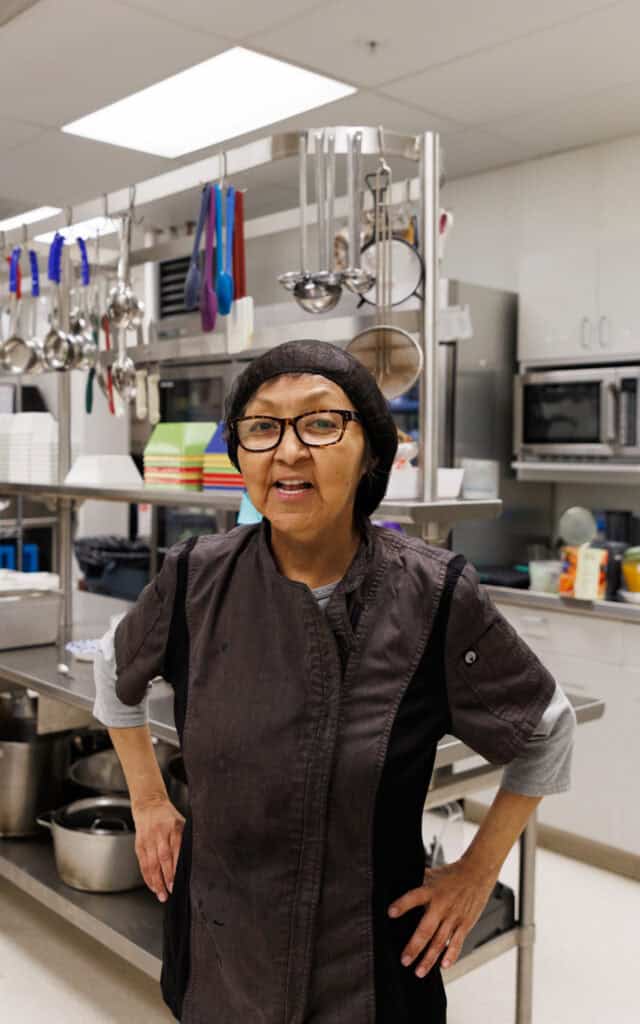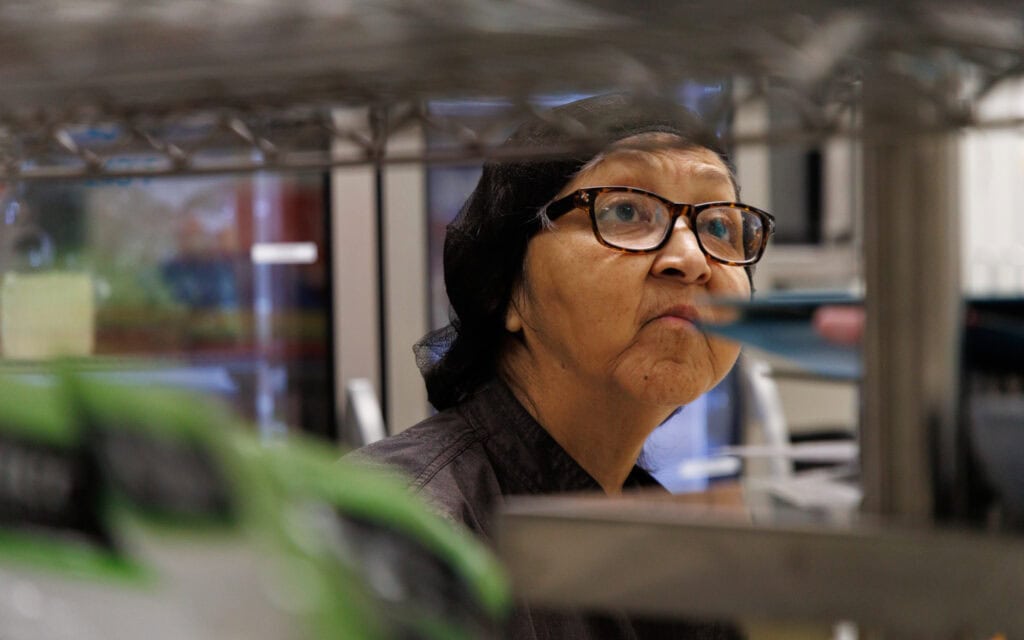06 Sep Opportunities for Elders
Stable income, connection with youth, and more keep elders involved at CITC
Years ago, before she came to the Clare Swan Early Learning Center (CSELC) kitchen, Roberta Jamestown worked on a boat.
“I used to commercial fish with my kids’ dad for ten, fifteen years, or so. I worked on the deck, and my kids grew up on the boat. I think that’s maybe where I got the stamina,” she said.

Stamina is important: Roberta works as a kitchen assistant at CITC’s early learning center, where she’s on her feet almost all day. She prepares food and does dishes for the babies and toddlers served by the center—just like she once prepared meals and cleaned up after her own children.
At 68, Roberta could be enjoying retirement. For a time, she did. “Then the funding started getting low,” she shared. “So I started looking for jobs online.”
An AARP survey this year found that 20 percent of adults over 50 have no retirement savings, and 61 percent are worried they will not have enough money to support them in retirement. CITC’s Eldership program—similar to our internships for young people—provides a source of income for individuals 50 and older.
But the point of the Eldership program isn’t just to help retirees maintain an income.
“A lot of folks enter retirement, and they don’t have the social support network that they used to—and, as we know, isolation is not good for a person,” pointed out Kaity McAdams, CITC’s Learning and Development manager. “We want to provide those community connections however we can.”
This year, CITC’s board of directors prioritized the needs of our Elders by establishing programs that would create employment, volunteer, and other opportunities specifically for individuals over the age of 50.
Connection is built into this goal. Having a job to go to allows for social connection as retirees grow relationships with their coworkers.
For Roberta, the social aspect is a highlight of her role at CSELC.
“I love the teamwork. It’s always been a big plus for me,” she said.
The Eldership program also intentionally develops opportunities for Elders to connect with younger generations. Through activities like luncheons and cultural events, CITC’s college interns learn from the Eldership program participants as they talk about their experiences.
“We have found that the reciprocity between Elders and youth has created greater connections for the sharing of cultural values and traditions, even for our youngest generation at CSELC,” said CITC Chief Operations Officer Lee Ann Garrick, who brought the company-wide goal of focusing on Elders to the CITC board of directors in 2023.
Though Roberta didn’t come to CSELC through the Eldership program, her job at the early childhood center is one of several ways CITC is bringing Elders into active roles throughout the organization.

For Roberta, CITC illuminated an unexpected path. She first came to CSELC through CITC’s Career Development apprenticeship program, which creates paid positions for individuals to grow their skills on the job. Then, while she was working a front desk position at CSELC, a coworker asked if she minded helping unload a pallet of groceries.
“I was glad to help, and it made the day go faster,” Roberta said. “After that, they started calling me back to put the Costco order away, and I enjoyed working with them.”
Although a permanent administrative position wasn’t available at the end of Roberta’s apprenticeship, CSELC recognized Roberta’s skills, which perfectly suited the nutrition team’s needs, and offered her a position in the kitchen.
“I’d like to work as long as I can,” Roberta shared. “Even when I was in semi-retirement—I really enjoyed it, but staying home, there’s only so much you could do. I guess I enjoy being busy.”
CITC offers several opportunities for Elders to become active within the organization. The Eldership program prioritizes community engagement, physical health, mental wellbeing, and spiritual health for Alaska Native and American Indian individuals age 50 and older who would like to reenter the workforce. Program participants must complete a background and eligibility check.
Our Career Development department also actively seeks to connect Elders with employment opportunities through the Supported Work Experience. Learn more about that program here.
In partnership with RurAL CAP, CSELC’s Elder Mentor program places individuals ages 55 and older in classrooms to spend time with little ones. A stipend and training is provided; Elders are required to spend at least five hours per week with students throughout the school year. Learn more about the Elder Mentor program here.
Contact CITC Career Development at (907) 793-3467 or alaskaspeople@citci.org to engage with any of these opportunities.


